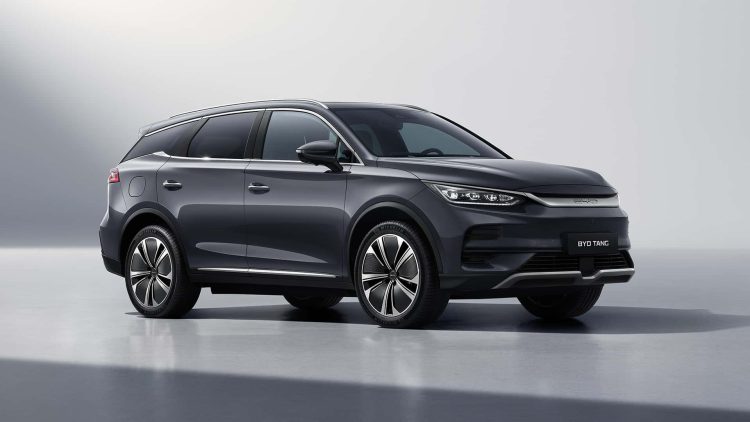BYD: A Leader in Electric Mobility and Sustainable Energy Solutions

. At the forefront of this revolution is BYD Company Limited (Build Your Dreams), a Chinese multinational corporation that has emerged as one of the world’s largest electric vehicle manufacturers. Founded in 1995, BYD has transitioned from a battery manufacturer to a comprehensive provider of electric vehicles, energy storage systems, and renewable energy solutions. This article delves into BYD’s history, innovative technologies, market presence, and future prospects.
Table of Contents
ToggleHistory and Evolution of BYD
BYD was founded in 1995 by Wang Chuanfu in Shenzhen, China. Initially focused on rechargeable batteries, the company quickly gained recognition for its lithium-ion battery technology. In 2003, BYD entered the automotive industry by acquiring the Tsinchuan Automobile Company, marking its transition from batteries to electric vehicles.
Key Milestones
- 2003: Entry into the automotive sector through the acquisition of Tsinchuan Automobile Company.
- 2008: Launch of the F3DM, the world’s first mass-produced plug-in hybrid vehicle.
- 2010: Expansion into the international market, with the establishment of partnerships and distribution networks in Europe and North America.
- 2015: Launch of the BYD Tang, a plug-in hybrid SUV that garnered significant attention and sales.
- 2020: BYD became the largest electric vehicle manufacturer in the world, surpassing Tesla in total vehicle sales.
Product Offerings
BYD’s product portfolio is diverse, encompassing electric vehicles, batteries, energy storage systems, and renewable energy solutions.
Electric Vehicles
BYD’s electric vehicle lineup includes passenger cars, buses, trucks, and monorails, catering to various market segments.
Passenger Cars
- BYD Han: A luxury electric sedan that combines performance with advanced technology, featuring a sleek design and long-range capabilities.
- BYD Tang: An SUV that offers both electric and plug-in hybrid variants, known for its spacious interior and cutting-edge features.
- BYD Qin: A compact sedan available in both hybrid and fully electric versions, appealing to urban commuters.
Commercial Vehicles
BYD is a leader in electric buses, with its models operating in cities across the globe. The company’s electric buses are known for their efficiency, low operating costs, and reduced environmental impact.
- BYD K9: An all-electric bus that has been widely adopted in various cities for public transport.
- BYD eBus: A versatile electric bus platform designed for different applications, including school and shuttle buses.
Trucks and Vans
BYD also produces electric trucks and vans for logistics and delivery services. These vehicles are designed to meet the growing demand for sustainable urban transportation.
Battery Technology
BYD is one of the world’s largest manufacturers of batteries, producing lithium iron phosphate (LiFePO4) batteries known for their safety, longevity, and efficiency. The company’s battery technology is used not only in its electric vehicles but also in energy storage systems that support renewable energy integration.
Energy Storage Systems
BYD’s energy storage solutions are designed to optimize energy use and integrate renewable energy sources. The company’s products include residential, commercial, and utility-scale energy storage systems, contributing to the transition towards sustainable energy.
Global Presence
BYD has established a significant global presence, with operations in over 50 countries and regions. The company’s international expansion strategy has focused on partnerships, local manufacturing, and adapting products to meet regional needs.
North America
In North America, BYD has made substantial inroads, particularly in the electric bus market. The company operates manufacturing facilities in California, producing electric buses for several major cities, including Los Angeles and New York.
Europe
BYD has expanded its footprint in Europe, partnering with various municipalities to supply electric buses and vehicles. The company’s European headquarters is located in the Netherlands, from where it oversees operations across the continent.
Asia-Pacific
BYD’s primary market remains China, where it enjoys a dominant position in the electric vehicle sector. The company has also made significant investments in countries like Australia and Japan, promoting electric mobility solutions.
Innovations and Technological Advancements
BYD is committed to research and development, continuously innovating its products and technologies to maintain its competitive edge.
Blade Battery Technology
One of BYD’s most significant innovations is its Blade Battery technology, which enhances safety and energy density. The design resembles a blade, allowing for more efficient use of space within the battery pack. This technology has been a game-changer, addressing safety concerns associated with conventional lithium-ion batteries.
Autonomous Driving
BYD is investing in autonomous driving technology, collaborating with various tech companies to develop advanced driver-assistance systems (ADAS) and fully autonomous vehicles. The company’s goal is to enhance safety and convenience for its users.
Renewable Energy Integration
BYD is also focused on integrating its electric vehicles with renewable energy sources. The company’s energy storage systems can store solar or wind energy, allowing users to charge their electric vehicles with clean energy, further reducing their carbon footprint.
Sustainability Initiatives
BYD’s commitment to sustainability extends beyond electric mobility. The company aims to create a sustainable ecosystem that encompasses energy production, storage, and consumption.
Zero Emission Goals
BYD has set ambitious goals to achieve carbon neutrality in its operations by 2040. The company is working to minimize emissions throughout its supply chain and promote the use of electric vehicles as a means of reducing urban air pollution.
Circular Economy
BYD is actively pursuing a circular economy model by recycling and reusing materials in its production processes. The company aims to reduce waste and lower its environmental impact while promoting sustainability across its operations.
Challenges and Competitors
Despite its success, BYD faces several challenges in the competitive electric vehicle market.
Market Competition
The electric vehicle industry is becoming increasingly competitive, with established automakers and new entrants vying for market share. Companies like Tesla, Volkswagen, and NIO are all significant competitors, each with unique offerings and technological advancements.
Regulatory Challenges
As BYD expands its operations globally, it must navigate different regulatory environments. Adapting to varying emission standards, safety regulations, and market demands can be challenging for the company.
Supply Chain Issues
The global semiconductor shortage and fluctuations in battery raw material prices pose risks to BYD’s production capacity. The company must manage its supply chain effectively to ensure the timely delivery of vehicles and components.
Future Outlook
Looking ahead, BYD is well-positioned to continue its growth trajectory in the electric vehicle market. Several factors contribute to its positive outlook:
Growing Demand for Electric Vehicles
The global shift towards sustainable transportation is expected to accelerate, with increasing government support, consumer awareness, and infrastructure development. BYD’s early investment in electric mobility positions it to capitalize on this growing demand.
Expansion of Product Offerings
BYD continues to expand its product portfolio, exploring new segments such as electric aviation and marine transportation. By diversifying its offerings, the company can tap into new markets and revenue streams.
Strategic Partnerships
BYD is actively pursuing partnerships with technology companies, municipalities, and other stakeholders to enhance its product offerings and market presence. Collaborations in areas such as autonomous driving, energy storage, and renewable energy integration will bolster the company’s competitiveness.
Conclusion
BYD’s journey from a battery manufacturer to a global leader in electric mobility and sustainable energy solutions exemplifies its commitment to innovation and sustainability. With a diverse product portfolio, a strong global presence, and a focus on technological advancements, BYD is well-equipped to navigate the challenges of the electric vehicle market and seize the opportunities that lie ahead. As the world transitions towards a more sustainable future, BYD’s role in shaping the future of transportation and energy is set to become increasingly significant.





